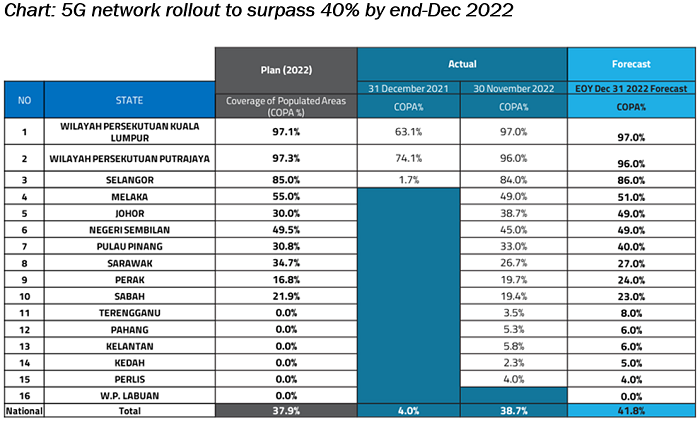DNB: Malaysia’s 5G network to exceed 40% coverage by end-2022, on track to hit 80% by 2024
By Digital News Asia December 12, 2022
- One of world’s fastest 5G rollouts, over 14mil people covered by end-2022
- Network averaging 394Mbps download against 4G’s 35Mbps download

Digital Nasional Bhd (DNB) has announced, in a statement, that its 5G network is ahead of schedule and will exceed 40% coverage of populated areas (COPA) nationwide by December 2022 and is on track to achieve the committed 80% COPA by 2024 or earlier.
The network currently includes almost all of Wilayah Persekutuan, Putrajaya, Selangor, and significant parts of Penang, Johor, and Negeri Sembilan, as well as some parts of Malacca, Perak, Kelantan, Sabah, and Sarawak.
DNA estimates the network will reach 14 million people, and in excess of 30 million over the next two years.
The 40% COPA will be achieved with approximately 3,500 sites against an initially planned 4,018 sites. DNA explains that this reduced site count is a result of supply chain issues, and delays in securing local council approvals primarily in Selangor and Sarawak. These issues have largely been resolved and the network will be deployed progressively in 2023. In order to overcome the delays experienced and to achieve the 40% COPA, DNB redirected its network deployment efforts to those states initially intended for 2023 and beyond.
David Hägerbro (pic), Head of Ericsson Malaysia, Sri Lanka & Bangladesh, said: “The rollout of the 5G network by Digital Nasional Bhd is one of the fastest in the world, having commenced deployment only in October 2021.”
One of the fastest 5G rollouts in the world
Nasution Mohamed, COO of DNB, said, “On the basis of demand for 5G services as well as support received for the necessary approvals from the various state and local council authorities to accelerate network deployment, we are confident of achieving 80% COPA within the next 18 months.”
To date, five of six Mobile Network Operators (MNOs) in Malaysia, who collectively have well over 20 million subscribers – Celcom Axiata Bhd, Digi Telecommunications Sdn Bhd, Telekom Malaysia Bhd, U Mobile Sdn Bhd and YTL Communications Sdn Bhd (YES) – have commenced making retail 5G services available to their end users, following the signing of their respective 5G Access Agreements with DNB on 31 October 2022.
However, Maxis Bhd customers will not be able to access 5G services just yet, pending its shareholders’ approval to execute the 5G Access Agreement, which Maxis has indicated it plans to seek in January 2023.

Significant increase in data traffic, uptake of 5G-compatible smartphones
DNB claims that 5G traffic has been surging, with 56,000 concurrent users utilising 146 Terabytes (TB) of capacity on 30 Nov, or the equivalent of 77,500 hours of high-definition movies. Those users are enjoying a better experience with 394 Mbps average download speed against the 4G download average of 35 Mbps.
Meanwhile, 5G-compatible devices continue to proliferate the market, with some 7 million devices already in the hands of end users to date. It is forecasted that the growth will double in 2023 and exceed 40 million devices by 2030.
End users are spoilt for choice with 12 device brands and more than 100 5G-compatible devices for all budgets available in the Malaysian market. This, coupled with myriad retail 5G data plan offerings from the five Malaysian MNOs will see accelerated 5G adoption among end users over the next few years.
iPhone users however, will have to wait until Apple gives effect to their retail plans with their partner MNOs before 5G services are offered to customers.
5G a gamechanger for enterprises
With enterprises widely expected to become a significant beneficiary, 5G is predicted to deliver a major economic tailwind that will serve to catalyse a host of new consumer, industrial, and enterprise applications, all of which are aligned with the Malaysian government’s long-term ambitions for the country.
According to DNB, the impact of 5G on productivity, efficiency, and innovation is projected to yield some US$147 billion (RM650 billion) in cumulative GDP uplift and create 750,000 high-value jobs between now and 2030.
An analysis by the National 5G Task Force Report expects Malaysia’s economy to undergo exponential growth by 2030 due to the 5G rollout. It is estimated that 5G will contribute US$1.93 billion (RM8.538 billion) to Malaysia's GDP in 2025, with an 8% annual growth scenario.
Meanwhile, 5G-enabled digital services will create new opportunities across multiple Malaysian industries, including energy, manufacturing, retail, construction, healthcare, logistics, agriculture, and others. DNB said it has engaged with the industry, alongside the MNOs, to execute 5G private network solutions as means to deliver these 5G-enabled services and use cases. Examples of engagements include the likes of Intel and Petronas.
Related Stories :


